How much higher could gold go?
Gold has been getting a lot of attention in the mainstream press recently, which suggests it's due a breather. But in the long run, £1,000 an ounce could be just the beginning. Dominic Frisby takes a look at just how high the price of gold could go from here.
Get the latest financial news, insights and expert analysis from our award-winning MoneyWeek team, to help you understand what really matters when it comes to your finances.
You are now subscribed
Your newsletter sign-up was successful
Want to add more newsletters?

Twice daily
MoneyWeek
Get the latest financial news, insights and expert analysis from our award-winning MoneyWeek team, to help you understand what really matters when it comes to your finances.

Four times a week
Look After My Bills
Sign up to our free money-saving newsletter, filled with the latest news and expert advice to help you find the best tips and deals for managing your bills. Start saving today!
A few months back I said we'd see £1,000 gold by the autumn.
I didn't think we'd get there this fast.
This week, gold made it onto the front page of the FT. And this lowly writer was even asked to come on BBC Radio 2's Drivetime show to talk about it. (Listen to the programme here and scroll to 1:32)
MoneyWeek
Subscribe to MoneyWeek today and get your first six magazine issues absolutely FREE

Sign up to Money Morning
Don't miss the latest investment and personal finances news, market analysis, plus money-saving tips with our free twice-daily newsletter
Don't miss the latest investment and personal finances news, market analysis, plus money-saving tips with our free twice-daily newsletter
So I see some potential for downside. Gold usually only hits the mainstream like this towards the end of runs. And moves like the one we've had over the last month or two have to correct. I expect there will be some selling pressure as the US decides what it's going to do about its debt and the expectation panic' settles.
Does this mean we should be selling? Perhaps in your trading account'. Otherwise, absolutely not.
Owning gold is not the risk, "not owning gold is", as Marc Faber said last week. Longer term we are going a lot higher.
How high? Well, I've come across some interesting research this week by Thomas Paterson of Gold Made Simple that proposes some refreshingly new answers to that question
The explosion in the Bank of England's balance sheet
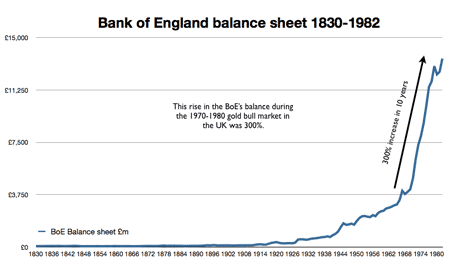
(I'm not going to explain the workings of these BoE balance sheets today, but the essential thing to grasp is that they tell us how much money is in circulation, be it physical paper or electronic money available to be lent via the banks).
During the 1970s gold rose 2,500%, from the (artificially low) price of £15 an ounce to £371 by 1980. Paterson observes, "a 300% increase in money supply resulted in a 2,500% rise in the price of gold".
Fast forward to today and we see that 300% increase in the BoE balance sheet looks positively restrained, prudent even. In the 11 years since 2000, the BoE has increased its balance sheet "by a staggering 1,000%", says Paterson.
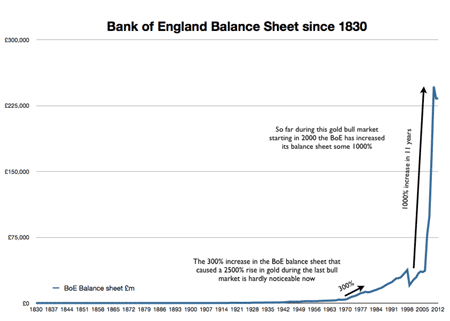
In that time gold has risen about 530%, from £180 to £1,000 an ounce this week. For the 2,500% rise of the 1970s to be replicated, you're looking at a final destination of £4,500. But if you factor in BoE money creation, you can more than triple that number.
Of course, I should point out that the flaw with comparisons to the 1970s is that the 70s bull market began from artificially low levels. The gold price was fixed until 1971. There are those who would argue that gold, if not fixed, was suppressed in the 1980s and 90s indeed still is but let's not go there for now.
I will say this though. The monetary stress the world faces today comfortably exceeds that of the 1970s.
Could the gold price really go above £20,000 an ounce?
I wrote about veteran gold trader Jim Sinclair's model
Let's tackle our own money issuance with some same thinking. How high would the gold price have to be if the BoE's gold holdings were somehow to reflect its money in issue?
Throughout the 19th and early 20th centuries, the UK is supposed to have been on a gold standard. In reality, only about 25% of the UK money supply was backed by gold, although this percentage varies, ranging from about 15% in the early to mid 1800s to over 50% in the 1920s. I quote Paterson:
"In 1850 the balance sheet of the BoE was about £63m, and there were 2.63 million ounces of gold sitting in a vault at the BoE. So for every ounce of gold there was about £18 in existence. The gold price was set at £4.25 so about 25% of UK money supply was backed by gold."
By 1921, the balance sheet had grown to £300m or so, with 27 million ounces of gold backing it. With the gold price at £5.35, about 50% of the UK money supply was gold-backed.
By 1965, we were back down to 25%, with £3bn on the BoE balance sheet backed by 65 million ounces of gold at £12.50. Then, by 2000, just 12% of the BoE balance sheet was backed by gold.
Since then, money-printing by the BoE has been so rampant that, despite the rising gold price, just 4% of the BoE balance sheet is backed by gold.
Here we see the chart that shows the percentage backing by gold of the UK money supply since 1830.
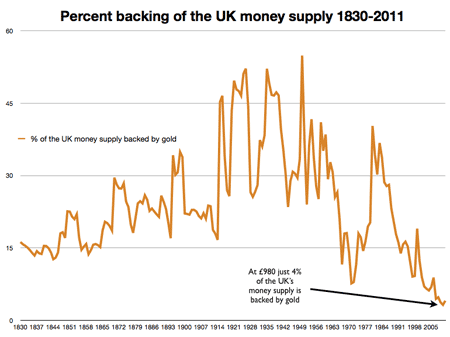
In other words, there is a lot of room for gold to appreciate if it is to catch up with the money supply.
Here's another way to look at it. From 1830 to 1950 there were 20 pounds on the BoE balance sheet for every ounce of gold. From 1950 to 1965 the figure averaged £40. (See the chart below).
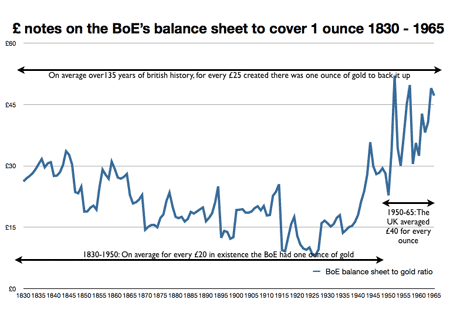
Now we see today.
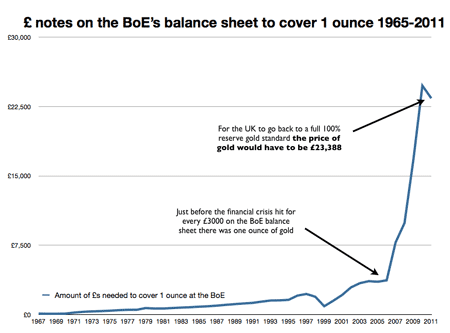
There are £23,388 for every gold ounce at the Bank Of England! And Paterson calculates that, for UK money to be 100% gold backed, at current levels of money supply that is the price gold would have to be per ounce.
I doubt that's going to happen. And of course, the BoE could shrink its balance sheet or even buy more gold which would change the equation again. But as things stand, even if we were to return to the long-term average of 25%, you're still looking at several multiples of today's price. Some nice food for the bulls.
Our recommended article for today
Could this be the next hot sector in the stock market?
The Gold Profit Plan is a regulated product issued by MoneyWeek Ltd. The FSA does not regulate certain activities, this includes the buying and selling of some commodities such as gold. Advice relating to investing in gold related shares or products is regulated by the FSA. Your capital is at risk when you invest in shares, never risk more than you can afford to lose. Please seek independent financial advice if necessary. Customer Services: 020 7633 3780
Get the latest financial news, insights and expert analysis from our award-winning MoneyWeek team, to help you understand what really matters when it comes to your finances.
MoneyWeek is written by a team of experienced and award-winning journalists, plus expert columnists. As well as daily digital news and features, MoneyWeek also publishes a weekly magazine, covering investing and personal finance. From share tips, pensions, gold to practical investment tips - we provide a round-up to help you make money and keep it.
-
 Can mining stocks deliver golden gains?
Can mining stocks deliver golden gains?With gold and silver prices having outperformed the stock markets last year, mining stocks can be an effective, if volatile, means of gaining exposure
-
 8 ways the ‘sandwich generation’ can protect wealth
8 ways the ‘sandwich generation’ can protect wealthPeople squeezed between caring for ageing parents and adult children or younger grandchildren – known as the ‘sandwich generation’ – are at risk of neglecting their own financial planning. Here’s how to protect yourself and your loved ones’ wealth.

